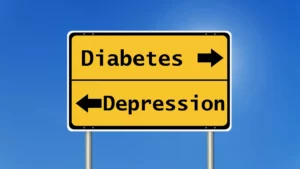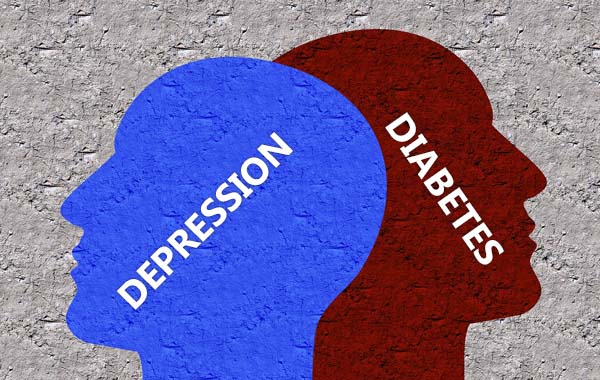If you are living with diabetes, you may also be living with depression. This is not an uncommon occurrence: in fact, it is estimated that up to 50% of people living with diabetes also experience depression. These two conditions can be complicated to navigate, but it is important to do so if you want to live a healthy and happy life. In this blog post, we will discuss the relationship between diabetes and depression and offer some tips on how to manage them both.
Contents
Defining Depression And Diabetes
 We are all aware of the terms depression and diabetes as synonyms for feeling sad or eating too much sugar respectively. However, these are not the only definitions of these terms. In order to better understand how diabetes and depression can co-exist, it is important to know the clinical definitions of each condition.
We are all aware of the terms depression and diabetes as synonyms for feeling sad or eating too much sugar respectively. However, these are not the only definitions of these terms. In order to better understand how diabetes and depression can co-exist, it is important to know the clinical definitions of each condition.
Depression is a mental illness that is characterized by persistent feelings of sadness, anxiety, or hopelessness. These feelings can interfere with your daily life and make it difficult to enjoy activities that you used to find pleasurable. Depression can also cause physical symptoms, such as fatigue, changes in appetite, and difficulty sleeping.
Diabetes, on the other hand, is a chronic condition that occurs when your blood sugar levels are too high. This can be caused by a number of factors, including genetics, lifestyle choices, and certain medical conditions. Diabetes can lead to a number of serious health complications, such as heart disease, stroke, and kidney damage.
Can Diabetes Cause Depression?
Now that we know the clinical definitions of these disorders, let us learn about their impacts on each other. It is important to note that depression does not always occur in people with diabetes- however, the reverse is also true. People who have diabetes are more likely to experience depression than those who do not have the condition. There are a few reasons why this may be the case.
- First, dealing with a chronic illness can be difficult and frustrating. You may feel like you are not in control of your own body and that can be very discouraging.
- In addition, the physical symptoms of diabetes can also contribute to feelings of depression. For example, fatigue and changes in appetite can make it difficult to participate in activities that you once enjoyed.
- Moreover, the insulin imbalance that is caused by diabetes can also lead to mood swings and irritability. This is because depression also accompanies a hormonal imbalance.
- It is also worth noting that people with diabetes are more likely to have other chronic health conditions, such as heart disease or stroke. These conditions can also contribute to feelings of depression.
- Finally, the financial burden of managing a chronic illness can also lead to feelings of depression.
These are the influences of physical, hormonal, and social causes that can lead to the development of depression in people with diabetes.
Can Depression Cause Diabetes?
The reverse of what we learned above also holds a significant amount of water. Depression can actually lead to the development of diabetes. Studies have shown that people who are depressed are more likely to develop type II diabetes.
- This is because depression can lead to unhealthy lifestyle choices, such as overeating, drinking, smoking, and sedentary behavior. These choices can lead to weight gain, which is a major risk factor for type II diabetes.
- In addition, depression can also cause changes in hormones that can lead to insulin resistance. This means that the body does not respond as well to insulin, which can lead to high blood sugar levels.
- Additionally, people who are depressed may be less likely to exercise, which can lead to weight gain and further complications from diabetes.
- Depression can also interfere with self-care, which is essential for managing diabetes. For example, people who are depressed may be less likely to take their medication or follow a healthy diet.
These are the ways in which depression can actually lead to the development of diabetes.
What Are The Warning Signs?
It can be tricky to stay on top of both diabetes and depression. This is because they both have a lot of overlapping symptoms. However, there are some warning signs that you can look out for.

For diabetes, the warning signs include:
- Increased thirst
- Frequent urination
- Extreme hunger
- Weight loss
- Fatigue
- Blurry vision
For depression, the warning signs include:
- Loss of interest in activities that you once enjoyed
- Changes in appetite or weight
- Difficulty sleeping
- Fatigue
- Feelings of worthlessness or guilt
- Difficulty concentrating
If you are experiencing any of these symptoms, it is important to reach out to a diabetes expert or mental health professional. They will be able to help you diagnose and treat the underlying condition.
What Causes These Conditions?
Wether it is a psychological condition or physiological, the causes of any condition can not be narrowed down to one specific thing. The causes are different for everyone.
For example, some people with diabetes may have a family history of the condition. Others may have lifestyle choices that led to the development of the disease.
Similarly, the causes of depression can vary from person to person. Some people may have a genetic predisposition to the condition. Others may have experienced a traumatic event that led to the development of depression.
The important thing to remember is that these conditions are not your fault. You cannot control the causes. However, you can control how you manage and treat the conditions.
How Do They Impact Our Life?
It is no secret that whatever happens within our bodies has effects on the outside too. This implies that our mental health also has physical manifestations.
For example, depression can lead to fatigue, which can make it difficult to get out of bed in the morning. This can then lead to missed work days, which can impact our career and finances.
Diabetes can also have a major impact on our lives. For example, the condition can lead to complications such as heart disease, stroke, and kidney disease. These complications can lead to hospitalization or even death.
It is important to remember that these conditions are serious and should not be taken lightly. If you are struggling, please reach out for help.
What Is The Diagnostic Procedure?
 If you suspect that you may have diabetes or depression, it is important to reach out to a doctor. They will be able to perform the necessary tests to make a diagnosis.
If you suspect that you may have diabetes or depression, it is important to reach out to a doctor. They will be able to perform the necessary tests to make a diagnosis.
For diabetes, the diagnostic tests include:
- A fasting blood sugar test: This test is done after you have fasted for at least eight hours. It measures your blood sugar levels.
- A hemoglobin AIC test: This test measures your average blood sugar levels over the past three months.
- A random blood sugar test: This test is done at any time of day. It measures your blood sugar levels.
For depression, the diagnostic tests include:
- A physical exam: This is done to rule out any other medical conditions that may be causing your symptoms.
- A psychological evaluation: This is done to assess your symptoms and rule out any other psychological conditions.
Your doctor will likely order one or more of these tests to confirm a diagnosis. Once the diagnosis is made, you can begin treatment.
What Are The Treatment Options?
Treatment for both these conditions is the best when it is holistic. This implies that both the physical and psychological aspects are taken into account.
For diabetes, treatment typically includes:
Diet: You will likely be asked to make changes to your diet. This may include eating more healthy foods and limiting sugary and processed foods.
Exercise: You will likely be asked to increase your physical activity. This may include going for walks, doing yoga, or lifting weights.
Medication: You will likely be prescribed medication to help control your blood sugar levels.
For depression, treatment typically includes:
Counseling: You will likely be referred to a counselor or therapist. They will help you understand and manage your depression.
Medication: You will likely be prescribed medication to help control your symptoms.
Hospitalization: In some cases, you may need to be hospitalized for treatment. This is usually done if you are a threat to yourself or others.
These are just some of the treatment options that are available. It is important to work with your doctor to find the best treatment plan for you.
Conclusion
In conclusion of our bog post, it is evident that diabetes and depression are two conditions that can have a major impact on our lives. If you suspect that you may have either of these conditions, it is important to reach out to a doctor. They will be able to perform the necessary tests to make a diagnosis. Once the diagnosis is made, you can begin treatment. Treatment for both these conditions is the best when it is holistic.
If you or someone you know is looking for psychological help, Therapy Mantra is here for you. We are the leading providers of online therapy and counseling. Our team of highly trained and experienced therapists can provide assistance at the most affordable rates. You can also get in touch with the nutrition experts to know more about our Diabetes Control Program. Contact us today to learn more about our services. You may also visit our website to book an online therapy session or download our free Android or iOS app for more information. Click here for diabetes clinic franchise.


